Asia-Pacific Economic Cooperation (APEC)
The 24th APEC Economic Leaders’ Meeting in Peru
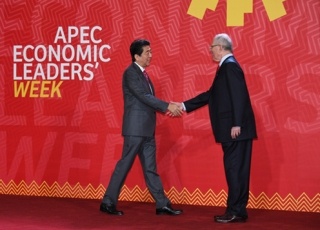 (Pool Photo)
(Pool Photo)
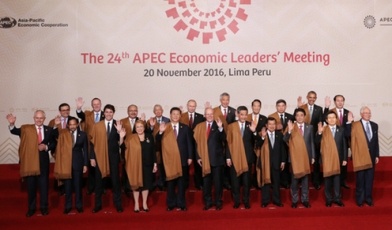 (Pool Photo)
(Pool Photo)
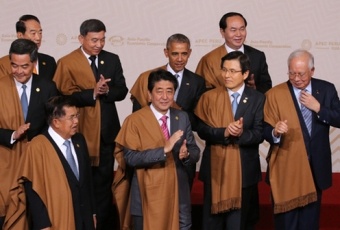 (Pool Photo)
(Pool Photo)
Prime Minister Shinzo Abe attended the APEC Economic Leaders’ Meeting held in Lima, Peru on November 19th and 20th representing Japan. Under the chairmanship of H.E. Mr. Pedro Pablo Kuczynski, President of the Republic of Peru, discussions were held on a wide variety of topics under the overall themes of “Quality Growth and Human Development” such as the promotion of regional economic integration (REI) and quality growth, the enhancement of the regional food market, the modernization of Micro, Small and Medium- Enterprises (MSMEs) and the development of human capital.
The meeting adopted APEC 2016 Leaders’ Declaration (English (PDF) / Japanese (PDF)
/ Japanese (PDF) ) and as its annexes, the “Lima Declaration on the Free Trade Area of the Asia-Pacific (FTAAP)” (English (PDF)
) and as its annexes, the “Lima Declaration on the Free Trade Area of the Asia-Pacific (FTAAP)” (English (PDF) / Japanese (PDF)
/ Japanese (PDF) ) and the “APEC Services Competitiveness Roadmap(2016-2025)” (English (PDF)
) and the “APEC Services Competitiveness Roadmap(2016-2025)” (English (PDF) / Japanese (PDF)
/ Japanese (PDF)
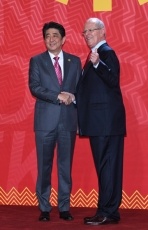 (Pool Photo)
(Pool Photo)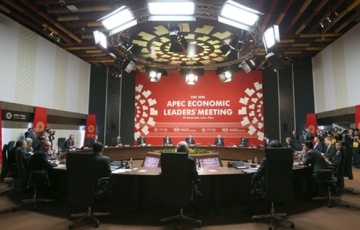 (Pool Photo)
(Pool Photo)
1. Schedule of the Leaders’ Meeting
| 11/19 | Afternoon | APEC Business Advisory Council(ABAC) Dialogue with APEC Leaders. |
| 11/20 | Morning | Session on the regional and global economies (Guest: Ms.Christine Lagarde, IMF Managing Director) |
| Leaders’ Retreat 1 | ||
| “Challenges to Free Trade and Investment in the Current Global Context” | ||
| Afternoon | Leaders’ Retreat 2 | |
| “Food Security, Climate Change Adoption and Access to water” | ||
| “Integration the Asia Pacific :Towards a Real and Functional Connectivity in the Region” |
2. Summary of Prime Minister Abe’s Statement
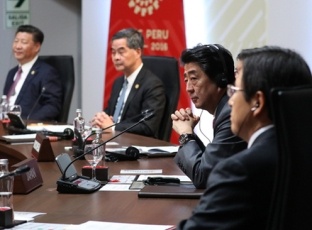 (Pool Photo)
(Pool Photo)
The following is a summary of Prime Minister Abe’s statement on the discussions regarding matters such as the forecast of the global economy, policies to promote the Free Trade Area of the Asia-Pacific (FTAAP), integration of MSMEs into the global value chain, digital trade, and invigoration of the service industry.
- Prime Minister Abe expressed the need for leaders to use all policy measures - monetary, fiscal, and structural - individually and collectively, to respond the growing downside risks to the global economy, while introducing Japan’s proactive initiatives.
- Prime Minister Abe stressed that free trade is the foundation of global economic growth. He also expressed Japan’s intention to continue to promote free trade by progressing policies to bring about “Inclusive Growth” in response to the protectionism brought about by growing disparity. He further expressed that the Trans Pacific Partnership (TPP) would create a free and fair international economic system , which would serve as a foundation of “Inclusive Growth,” and that targeting comprehensive and high quality FTAAP would work as another basis of “Inclusive Growth.”
- Prime Minister Abe stated that realizing the Inclusive Economy is indispensable to cultivating sustained public support for free trade, introduced Japan’s activities to realize its initiative of “The Japan’s Plan for Dynamic Engagement of All Citizens,” and emphasized it as a strong example of a growth strategy based on a “virtuous cycle of growth and distribution.”
- Prime Minister Abe additionally asserted the necessity of establishing and corresponding to a free and fair business environment for new businesses such as the service sector and digital trade.
3. ABAC Dialogue with APEC Leaders
A discussion was held between APEC leaders and ABAC members from each economy. In response to a question from a ABAC member on how to respond to protectionism and the skepticism of free trade, Prime Minister Abe explained the necessity of expanding the participation of women and the elderly in society, as well as the need to disentangle the misperception that free trade is increasing income disparity and to erase disparity through economic policies. Prime Minister Abe additionally explained that the advancement of women’s participation in economic sphere leads to a resilient society.
4. Further Plans
Vietnam is planned to host APEC next year (2017).
5. Achievement of the Meeting
(1) Building on the success of the G7 Ise-Shima Summit, Japan was able to lead discussions in what served as the culminating international meeting in economic field this year.
(2) Japan shared its endeavors to reinvigorate its economy through financial and fiscal policies and structural reform (mobilizing all policy measures). Japan additionally emphasized the need for APEC to band together as one to return the global economy to a growth trajectory.
(3) APEC reasserted its intention to promote free trade. In particular, it served as an opportunity to emphasize the significance of creating an international economic system based on free and fair rules through the TPP.
(4) Japan explained its initiatives for “Inclusive Growth” to magnify the benefits of free trade in society as a measure to foster sustained public support for free trade. Japan emphasized that “Inclusive Growth” would lead to a “virtuous cycle of growth and distribution,” the ultimate form of growth.
(5) Japan was able to confirm the political will to promote growing industries related to “Investment for the Future,” in particular the service industry and digital trade.

